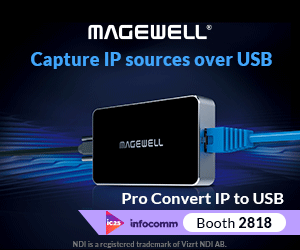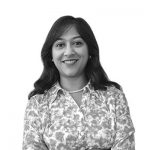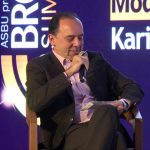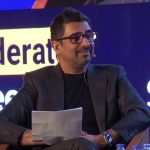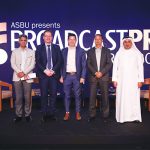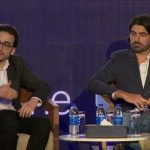What happens when a German contemporary artist arrives in Dubai to meet an Emirati art curator, with a camera and wearing a blindfold? As part of BBC World News series Collaboration Culture, producer Hattie Bowering tells BroadcastPro ME about creating The Eye of Dubai, blindfolded Before the summer of 2012, Berlin-born Christian Jankowski, a contemporary […]

What happens when a German contemporary artist arrives in Dubai to meet an Emirati art curator, with a camera and wearing a blindfold? As part of BBC World News series Collaboration Culture, producer Hattie Bowering tells BroadcastPro ME about creating The Eye of Dubai, blindfolded
Before the summer of 2012, Berlin-born Christian Jankowski, a contemporary performance artist with a reputation for being witty, yet mischievous, had never visited Dubai. Since the basis of his work revolves around the context of his everyday life, he has experimented with installations, video and photography, transforming ordinary situations into art. A trip to the UAE was about to become his next venture as part of Collaboration Culture, a seven-part BBC series which pairs creative and celebrated artistic figures together on an innovative project.
Producer Hattie Bowering, who was running this project for DPP Media in Dubai, says Jankowski was intrigued by Dubai and keen to explore it further.
But, if Jankowski had never seen Dubai authentically with his own eyes, why would he decide to explore the place with a camera, blindfolded?
He felt that there was a definite visual overload with Dubai and wanted to strip his experience of this and challenge himself to explore something beyond the citys surface, Bowering explains.
Jankowski collaborated on the project with Rami Farook, a UAE-based curator, who is also the founder and director of Traffic, a multipurpose art gallery and library in Dubai.
The experimental short film, The Eye of Dubai, sees Jankowski step off the plane wearing a blindfold, relying on Farook to guide him through the cultural experience of Dubai using all of his senses sans his sight. Filmed over the course of five days, it is directed by Jankowski under the editing supervision of Farook.
Jankowski himself does not see Dubai until a special audience screening during the last part of his trip, where Farook finally removes the blindfold for him. Up until this moment, the unique sensations offered by Dubai; the heat, the sand, the sea, the architecture, the tastes of local food, and the multicultural buzz of the city, are absorbed by Jankowskis remaining senses and through his visual guide, Farook.
This unusual technique of creating a documentary was a new concept for experienced arts producer Bowering.
She says: I have never blindfolded any contributors before but I have been making art and cultural films for the past 15 years mainly for the BBC and Channel 4, so I was well equipped to deal with artists. I am always keen to push boundaries especially in the UAE where so much production is beholden to corporate rather than creative agendas.
Jankowski had never heard of a movie that was shot, directed, filmed, recorded and sound recorded all blind, so he was curious to see its outcome.
To come to Dubai blindfolded was a way to open up a new way of making a film, he says, speaking of his experience.
There are so many voices around you!
Filming took place across the whole stretch of Dubai from Dubai International Airport, Dubai Creek and the souk to Ski Dubai, Jumeirah Al Qasr, the Serkal gallery district, and of course, the top of the Burj Khalifa, with Al Maha Desert Resort and Spa used for Jankowski to bond with camels and falcons. A pet cheetah was part of the shoot as well.
Everyone we encountered was very hospitable and took the arrival of our crazy circus in their stride, says Bowering.
With four BBC crew members, headed by director, Karen McGann, a German crew of three and Farooks team of four, who Bowering says were a tremendous asset, especially with herding the blindfolded Germans around town safely, The Eye of Dubai began shooting in a classic observational documentary style.
The Germans chose to shoot in black and white which was very effective and cut really nicely with the BBC footage, says Bowering.
Dubai looked wonderful in all the footage it is a great place to film.
McGann and the BBC team shot on the Canon C300, while the German crew shot all of the black and white footage with a Sony FS-100EK.
According to Bowering, the kit was kept to a minimum because the whole crew was continuously on the move.
In Bowerings opinion, German cameraman Armin Franzen achieved incredible results.
Considering he was blindfolded, there was a certain magic to all his footage searching out the action.
Three blindfolded Germans did prove to be quite challenging since they were being moved around in the infamous Dubai summer heat.
We moved slowly. We drew quite a bit of attention including the occasional security check from CID wondering whether we were undertaking the slowest hostage situation in history! recalls Bowering.
Communicating without eye-to-eye contact, also, was a hurdle.
We rely on eyes to convey so much and without any visual contact, you are left to voice and touch which was limiting and led to a bit of confusion at times! she says.
For the BBC film, post-production was taken care of back in the UK.
A local editor, however, edited the film shown to the Dubai audience at Jankowskis big reveal.
Kirsty Jones, who did the edit, was instructed by Jankowski while his eyes were still covered on how he wanted the film to be cut.
Bowering says: Jones did a tremendous job considering she was being instructed on visual editing from a man in a blindfold.
Bowering, who has been making documentaries for 15 years, has produced work for Art Dubai, Abu Dhabi Art, Christies Middle East and a host of UAE corporate clients. She hopes that The Eye of Dubai will mark a move towards more creative production in the Emirates.
Dubai is normally only presented as a series of picture postcards. It is rare that you get the opportunity to delve further. This film showed how Dubai can facilitate more challenging filmmaking.
The UAE, especially Dubai, has a thriving cultural scene that would really benefit from broadcast or on-line documentaries and reportage. It would be great to see local broadcasters commission cultural programming.
Kirsty Jones edit of The Eye of Dubai was showcased at Traffic, Farooks gallery in Al Quoz Industrial Area, Dubai. As part of the series, Collaboration Culture, the final BBC cut was aired in Summer 2012 on BBC World News as well.



